Jordan Maze joins NLP as Checkology® virtual classroom coordinator
A graduate of Colorado College with a degree in Russian and Eurasian studies, Maze spent several years working in Eastern Europe.
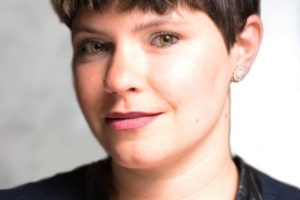 She served as an English teacher and as a research assistant at the Center for Applied NonViolent Actions & Strategies in Belgrade, Serbia, and as a project assistant for Sarajevo Open Centre in Sarajevo, Bosnia. Maze also was a deputy editor for Balkanist Magazine and has IT help desk experience.
She served as an English teacher and as a research assistant at the Center for Applied NonViolent Actions & Strategies in Belgrade, Serbia, and as a project assistant for Sarajevo Open Centre in Sarajevo, Bosnia. Maze also was a deputy editor for Balkanist Magazine and has IT help desk experience.
She speaks Spanish, Russian and Serbian/Bosnian/Croatian.
An intern’s path to news literacy
My father, who prides himself on being a “constitutionalist,” went on: “Well, he’s got America fooled.” And: “You’re living in a totally different world now, Amanda.”
I was too young to process what was going on, but I trusted my parents and I believed that Obama could only be bad for this country. Back then, I thought of the government as an immoral institution that didn’t have the majority’s best interest in mind.
2017: At 19, I now recognize that I lived in a political bubble. It took a move and a new school to start broadening the views that I was exposed to. And when I began an internship with the News Literacy Project, I realized that if I had been taught at a younger age what I learned this summer, I would have been spared a long and rocky road to reaching an understanding of news literacy. NLP taught me how to properly check citations for credibility and to research facts across different sources. This ability alone has made sifting through large amounts of information much more manageable and efficient.
As a child, I’d hear members of my extended family mutter “socialist devil” and yell “Oh, all you do is lie!” whenever they saw Obama on television. I was never exposed to anything positive about the president and his family until I moved from Austin, Texas, to New York City at age 16.
The students at my new high school were more liberal than my classmates in Texas, and, over time, I saw that although I had been raised as a conservative, I had no idea what I truly thought about politics. My new friends would discuss Obama, and I recognized that I knew nothing about his administration or policies. I had heard at home that nothing he said could be believed, and I knew that most people who were close to me couldn’t stand him. But once I came to the realization that their opinions weren’t necessarily mine, I decided to take a step back.
I stopped talking about the president. I figured I had no business expressing an opinion that I wasn’t even sure was mine. I started to lower the defenses I had been taught to put up when listening to or about Obama.
Instead, I began reading articles from news outlets across the political spectrum. And I entered my senior year of high school with this conclusion: I had absorbed too much vitriol against Obama and his administration to have an unbiased opinion. That possibly wasn’t the right lesson to take away; in hindsight, I see that I wasn’t equipped with the educational tools to know how to sift through the immense amount of information I was reading or how to distinguish news — facts presented impartially — from opinion, which can be fact-based but also include personal views or even advocacy. However, it did lead me to have the confidence to say, “Honestly, I don’t have enough unbiased information on that issue to have an opinion that I’m comfortable sharing right now.”
I didn’t know it then, but I was taking my first steps toward news literacy.
I began to hear people with opposing views, instead of just listening for the sake of arguing against them. I wasn’t afraid to acknowledge when someone made a good point, and I learned to disagree with a degree of curiosity — wanting to hear their response, rather than to pick a fight. I began to tell the difference between news and opinion.
Those skills became increasingly important when it came time for the 2016 presidential election — the first election I could vote in.
I was in my first year at Wesleyan University in Middletown, Connecticut. Between the polarized political atmosphere across the United States and the largely liberal environment on campus, I became increasingly frustrated with people simply parroting what they found on their Facebook feeds or other social media platforms. While I’m glad there are places online for everyone to share their opinion, I wish my peers wouldn’t read every Tumblr rant as if it were a Pulitzer Prize-winning news report. Amid all this chaos, I knew it was up to me to make an informed decision.
So I put two cable news outlets — CNN and Fox News — to the test. I livestreamed the Republican National Convention with friends, so there were no commercial breaks or commentary. For the Democratic National Convention, I decided to go back and forth between Fox and CNN. To avoid leaning left, I tried to watch more of the commentary on Fox. The results were not comforting.
What I found was that while CNN aired most of the speeches and the comments were generally positive, Fox didn’t even show half of the people at the podium. Instead, the Fox reporters and commentators were drowning them out — talking over them about topics that the speakers weren’t even discussing. As the first night of the convention came to an end, and more prominent figures such as Sen. Bernie Sanders, Sen. Elizabeth Warren and Michelle Obama took the stage, Fox finally started to stick with the speakers. I found myself wondering how CNN’s coverage during the Republican convention compared with this.
I didn’t stop there. I enrolled in government and economics classes. I began reading articles from a variety of news outlets, including The New York Times and The Wall Street Journal. I finally started to develop my own political opinions — and am finding that I’m more progressive on social issues and more conservative on fiscal ones.
News literacy is — and should be — an increasingly pressing concern in today’s world of social media and endless platforms for opinions. The lack of awareness of fake news and heavily biased news is what attracted me to accept an internship at the News Literacy Project. Being an intern at NLP has taught me how to properly sift through information and how to truly reach my own conclusion by checking facts and reading across multiple sources. Throughout this summer, I’ve seen what a difference these lessons can make.
I particularly urge high school and college students to try to make the distinction between news and opinion and begin implementing news literacy in their everyday lives. While it’s important to listen to different people and hear their points of view, it is even more important to process this information and formulate your own opinions. The News Literacy Project provides an excellent platform to begin educating yourself and others.
Amanda Muntz studies international law and globalization at the University of Birmingham in England. She was an NLP intern in the summer of 2017.
NLP partners with Arizona State University on news literacy education
In March, we pledged that we would be involved in nationwide efforts that tackle the urgent need of news literacy education.
Today, that time has come.
We’re proud to announce that we will be working with NewsCo/Lab, an initiative launched yesterday by the Walter Cronkite School of Journalism and Mass Communication at Arizona State University (ASU). This collaborative lab is aimed at helping the public find new ways of understanding and engaging with news and information.
“News Co/Lab promises to play a key role as both a clearinghouse for effective news literacy programs and practices and an incubator for finding new ways to connect newsrooms with their communities in the fight against misinformation and the erosion of trust in journalism,” said Alan C. Miller, the founder and CEO of the News Literacy Project (NLP). “We look forward to contributing to this vital mission.”
News Co/Lab is funded by a $300,000 grant from the News Integrity Initiative, a global consortium of funders and journalism-related organizations, including NLP. The idea was developed by the News Literacy Working Group, which convened in March. Miller was a member of that group.
In its first project, NewsCo/Lab will work with McClatchy, which owns 30 daily newspapers in 14 states, to help several of its newsrooms aid their communities in developing “innovations that increase transparency, engagement, mutual understanding and respect.” It will begin with the Kansas City (Missouri) Star and expand to two other McClatchy newsrooms.
News Co/Lab will also work with educators, librarians, newsrooms and community groups and other newsrooms across the country — and that’s where we come in.
To start, we will be sharing our best practices and resources, including the checkology® virtual classroom, with the three McClatchy newsrooms and the communities they serve. More than 8,500 educators in all 50 states and 66 other countries have signed up to use the virtual classroom, and they have the potential to reach more than 1.2 million students around the globe.
“We need to promote the News Literacy Project and other excellent programs — and we need to keep experimenting with new ideas,” said Eric Newton, NewsCo/Lab’s co-founder and the Cronkite School’s innovation chief. “The lab hopes to do both.”
We welcome this opportunity.
NLP’s new NewsLitCamps bring teachers to newsrooms for innovative professional development
Imagine a space where educators, journalists and news literacy experts can work together to find the most effective ways to teach students how to know what to believe.
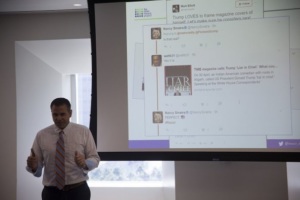 Welcome to NLP’s NewsLitCamp, where educators from some of the country’s biggest school districts, including Chicago, New York City and Miami, are getting a first-hand introduction to news literacy, along with tools they can use their classrooms.
Welcome to NLP’s NewsLitCamp, where educators from some of the country’s biggest school districts, including Chicago, New York City and Miami, are getting a first-hand introduction to news literacy, along with tools they can use their classrooms.
In these day-long professional development sessions, teachers and librarians at middle schools and high schools visit a news outlet in their city for training with journalists from that newsroom and our staff.
The workshops combine elements from traditional professional development programming with the more flexible, teacher-directed “edcamp” model. Educators tell us what topics they’re interested in and what they would like to take back to their schools from the training. We then work with journalists from the host news organization to create workshops that fit their requests.
“I now have a much better and concrete understanding of how to help students use their critical-thinking skills to get through our digital world,” said Danielle Lewis, a middle school librarian at the United Nations International School in New York City, who attended our NewsLitCamp at Time Inc. headquarters in August.
We start the day with an explanation of the importance of news literacy for students — an opportunity for participants to learn the core skills and concepts of news literacy education. They then attend specialized breakout sessions designed to demystify the news-gathering process and explain the standards of quality journalism. They might examine specific coverage areas, such as education or crime, or more general topics, such as the role of social media in disseminating news. Our goal for each NewsLitCamp is to develop teachers’ and librarians’ news literacy education skills and introduce them to specialized resources for teaching news literacy.
Feedback on these sessions has been overwhelmingly positive. “Best PD ever” was one teacher’s tweet about our first event, which included more than 90 teachers and school librarians at the Chicago Sun-Times in April. In New York City, 89 percent of survey respondents reported a high level of satisfaction with the training and said that what they had learned would be helpful in their teaching.
Heather Van Benthuysen, Chicago Public Schools’ manager of civic education, helped to organize the day at the Sun-Times.
“This was truly a unique experience … that has left a lasting impact,” she wrote us. “Feedback from teachers was overwhelmingly positive, and left them realizing the importance of news literacy instruction, and gave them some tools to implement.”
More than 80 teachers from the Miami-Dade County Public Schools participated in the third NewsLitCamp at the Miami Herald on Oct. 2.
NLP’s Peter Adams “was an incredible bastion of knowledge and had a teacher-like sensibility for the delivery of his content,” said Laura Ortega, one of the teachers who attended the Miami session.
NewsLitCamps are part of our expanded suite of professional development sessions, which include the three-part Teaching News Literacy series. For information about scheduling a NewsLitCamp in your area, contact Damaso Reyes, director of community partnerships and engagement, at [email protected].
New PD series coming in September
Teachers: You asked, and we answered! Teaching News Literacy is an affordable professional development series of three online workshops that will help you become news literacy leaders in the classroom.
 The hour-long sessions cover the basics of news literacy and delve into more complex topics, such as the connection between news literacy and civic involvement.
The hour-long sessions cover the basics of news literacy and delve into more complex topics, such as the connection between news literacy and civic involvement.
You will come away with fresh ideas, new tools and top-of-the-line resources that will help you integrate news literacy into your lessons and empower your students to become active and engaged participants in civic life.
The registration fee is $10 for a single session or $25 for all three.
NLP gives Student of the Year Award
When police in Washington, D.C., started using social media last March to post notices about missing children, 17-year-old Jenari Mitchell said she and her friends were gripped with fear that there was a sudden epidemic of teens who had disappeared. Viral posts claiming that young women were being abducted and sold by sex traffickers enflamed their concerns.
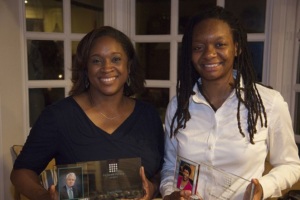
Mitchell (right) was presented with her award by Tracie Potts of NBC News Channel at an NLP staff and board dinner in June. Potts also was presented with an award as the co-winner of the John S. Carroll Journalist Fellow of the Year prize.
Then, Mitchell recalled some lessons she had learned from the News Literacy Project in her U.S. government class at KIPP DC College Preparatory, and she decided to check the rumors out.
What she discovered brought relief to her and her friends: The number of missing youths had actually declined, and most of the young women who had been reported as missing during that period were runaways.
Mitchell’s brave dose of skepticism and her ability to quickly apply news literacy lessons to the world around her led NLP to present her with its first Gwen Ifill Student of the Year Award. It honors the venerated broadcast journalist (and longtime NLP board member) who died last year.
On June 21, at NLP’s annual dinner for staff and board members, Mitchell received an engraved glass plaque with an etched photo of Ifill, the former moderator and managing editor of Washington Week and co-managing editor and co-anchor of PBS NewsHour. She also received a $250 gift card.
The sixth of eight children, Mitchell will begin classes in August at Rensselaer Polytechnic Institute in Troy, N.Y., where she plans to study computer science and software development. Scholarships and grants will cover most of her education costs.
Her government teacher at KIPP, Colleen Murphy, expressed confidence that Mitchell will take her news literacy lessons with her.
“Jenari is already using what she learned,” Murphy said. “She questions the authenticity of sources of information, she expects the media to uncover the truth, she speaks up for her rights. I think the exposure of the NLP came at a time when Jenari was receptive to its message and mission.”
In addition to applying her news literacy lessons by tracking down the viral rumors about missing teens, Mitchell also used them to develop an app with a friend. Called “Focus Token,” the app is designed to be a motivational and organizational tool for students. It includes a schedule, a goal tracker and resources for college, careers and support groups. “I made sure the resources were credible,” she said.
Tracie Potts wins NLP’s John S. Carroll Award
Tracie Potts, a Washington correspondent with NBC News Channel, is one of two recipients of this year’s John S. Carroll Journalist Fellow Award.
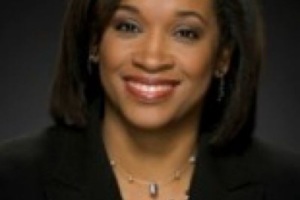 “I am so honored,” she said after being presented with the award at an NLP dinner in June. “To be selected from among well-deserving colleagues by a respected group of journalists and journalism educators makes this beautiful plaque quite valuable to me.”
“I am so honored,” she said after being presented with the award at an NLP dinner in June. “To be selected from among well-deserving colleagues by a respected group of journalists and journalism educators makes this beautiful plaque quite valuable to me.”
Named for one of the most revered newspaper editors of his generation, the award is given annually to volunteer journalists who contribute significantly to NLP and its mission. The honorees are selected by a committee of NLP board members and staff.
Paul Saltzman, the Sunday and investigations editor at the Chicago Sun-Times, was presented with his award at an NLP event in Chicago in May.
During her eight years as an NLP journalist fellow, Potts has delivered more than a dozen classroom lessons in schools in Washington, D.C., and Maryland. She also is the host of “Know Your Zone: Sorting Information,” the first lesson in NLP’s Checkology® virtual classroom.
In addition, she was featured in a Washington Post report about NLP, was pictured on the cover of NLP’s brochure and has assisted staff members at conferences.
NLP’s president and CEO, Alan C. Miller, described her as a “willing, enthusiastic and gracious stalwart” for news literacy.
Kyle Morean, who used NLP’s curriculum in his media literacy classes at Thurgood Marshall Academy Public Charter School in Washington, said that whenever Potts was the speaker, he knew his class would run long because the students were “eager to keep asking her questions.”
Potts, said Morean, was “an outstanding guest and engaging presenter.”
Recipients of the award receive $500 and an engraved glass plaque with an etched photo of Carroll, who was the editor of the Lexington (Kentucky) Herald-Leader, The Baltimore Sun and the Los Angeles Times. He also was one of NLP’s earliest supporters, served for four years as board chair and was a board member at the time of his death in 2015.
Saltzman wins 2017 John S. Carroll Journalist Fellow Award
Paul Saltzman, an editor at the Chicago Sun-Times, has won the News Literacy Project’s 2017 John S. Carroll Journalist Fellow Award.
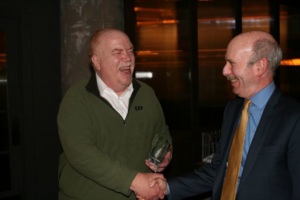 “Paul has been one of NLP’s most engaged and effective journalist fellows since he first volunteered in 2011,” said NLP President Alan C. Miller. “His remarkable dedication to our mission has earned him our heartfelt appreciation and this well-deserved recognition.”
“Paul has been one of NLP’s most engaged and effective journalist fellows since he first volunteered in 2011,” said NLP President Alan C. Miller. “His remarkable dedication to our mission has earned him our heartfelt appreciation and this well-deserved recognition.”
The award — named after the revered editor of three U.S. newspapers and the former chairman of NLP’s board — is given annually to volunteer journalists who contribute significantly to NLP and its mission. The honorees are selected by a committee of NLP board members and staff.
Saltzman is the Sun-Times’ Sunday editor and investigations editor for projects. Reports he has edited have won the Pulitzer Prize, the George Polk Award, the National Headliner Award for investigative reporting, the Society of Professional Journalists’ national Sigma Delta Chi Award for breaking news coverage and the National Association of Black Journalists’ Salute to Excellence Award.
He has been one of NLP’s most engaged journalist fellows, actively recruiting colleagues and organizing orientations, online conversations with students, field trips and other events. He has visited at least six classrooms across Chicago, has worked with two different student groups in local libraries as part of the News Know-how program, and has met with students during their field trips to the Sun-Times newsroom.
“When I first started working with the News Literacy Project, we were happy to be able to reach a couple dozen more kids,” Saltzman said. “Now, my paper has just hosted 100 teachers and librarians who’ll carry the message back to schools across Chicago.
“And the online lessons that I and others have done are seen around the world — even in Macedonia, storied birthplace of so much fake news. But what I thought at the beginning is still what I think: How could anyone not want to do this?”
Saltzman has played an important role in NLP’s e-learning efforts: He was featured in several early video and digital lessons, leads one — “What Is News?” — in NLP’s Checkology® virtual classroom and helped to create a graphic organizer featuring seven key questions, dubbed “The Saltzman Seven.”
“He is remarkably dedicated to NLP’s mission,” said Peter Adams, NLP’s senior vice president for educational programs, who lives in Chicago and has worked closely with Saltzman. “In fact, he has yet to say no to any request an NLP staffer has ever made of him — no matter how substantial.”
Saltzman is one of two NLP journalist fellows to be honored with the Carroll Award this year. He received the prize — $500 and a glass plaque with an etched photo of Carroll — at a private dinner in Chicago in May. The second recipient will be announced in June.
“I’m proud to be a part of the News Literacy Project, hoping to do much more and very appreciative of this honor,” Saltzman said.
Carroll, the second person to join NLP’s board, died on June 14, 2015. He also served four years as board chairman and remained on the board until his death. He was the editor of the Los Angeles Times from 2000 to 2005, during which time the paper won 13 Pulitzer Prizes. He also was the editor of The Baltimore Sun (1991-2000) and the Lexington (Kentucky) Herald-Leader (1979-1991). He served on the Pulitzer Prize board from 1994 to 2003 and was its chairman in 2002.
Student calls NLP’s Checkology platform ‘super-vital’
“My generation — whatever we see on social media, we believe,” Daniella Alexander, a high school senior, told a group of News Literacy Project supporters and friends at a VIP breakfast Wednesday with Chuck Todd of NBC News.
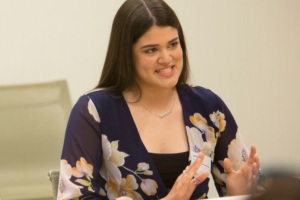
Daniella Alexander, a senior at Wakefield High School in Arlington, Virginia, addresses guests at the VIP breakfast.
And because of NLP’s latest resource, the Checkology® virtual classroom, Alexander now looks at what she reads a lot more skeptically.
She acknowledged that she hadn’t really cared about the news before she participated in the virtual classroom as part of her government class at Wakefield High School in Arlington, Virginia. But now, she said, she is “able to stop and say, ‘Hmm. This is not reliable! This source isn’t credible!”
“I’ve developed a newfound appreciation for journalism and how it works,” she said. The platform “taught me to have both sides of the story, whether or not I like them or not.”
“It’s definitely necessary for my generation, especially, and for the generation after me,” she added. It “gave me skills that I will need and that I can pass on to people and tell them, ‘Checkology® is so accessible, it’s so easy … you can learn so much from it.’”
In short, Alexander said, “Checkology® is super-vital and super-important.”
Patricia Hunt, Alexander’s teacher, also praised the platform, telling the group at the breakfast that her students “now have the language, have the tools, to look at pieces objectively. They can be skeptical consumers of news.”
Hunt’s use of the Checkology® platform was featured in December in a report on NPR’s All Things Considered about “the classroom where fake news fails” and again in February in a piece on the evening news on WJLA-TV, the ABC affiliate for the Washington area. In addition, she was quoted in an article last month on CNN’s website that described the virtual classroom as one of the “new weapons” in the war on fake news.
NLP responds to Mike Caulfield’s review of our work
Mike Caulfield, director of blended and networked learning at Washington State University’s Vancouver campus, has written a blog post in which he takes issue with what he understands to be the focus and methods of news literacy as a field.
“How ‘News Literacy’ Gets Web Misinformation Wrong” was published last month on Caulfield’s own website and earlier this month on Medium and Observer.com. In it, Caulfield specifically cites our Checkology® virtual classroom, a web-based e-learning platform for educators and students in middle school and high school.
We thank Caulfield for his interest in our work and for advancing the discussion on the literacies that contemporary students need to learn to become critical thinkers. For him, it’s web literacy; for us, it’s news literacy. In many ways, we agree with Caulfield’s ideas; in others, we take a narrower view. In this case, we believe his critique of our work offers an opportunity to demonstrate how we define and teach news literacy.
The News Literacy Project was founded in 2008 with this guiding principle: to teach students to sort fact from fiction in the digital age. Our lessons have been successfully implemented in middle schools, high schools, libraries and after-school programs, starting with our first pilots in the spring of 2009. They’ve also been embraced by educators: As many as 5,600 teachers serving more than 850,000 students throughout the United States and in 50 other countries have registered to use the Checkology® virtual classroom since it was released last May.
In his piece, Caulfield tries to address what he considers weaknesses in the Checkology® platform. However, the resource that he references throughout his piece is not the virtual classroom, and it is not part of the Checkology® lessons. It is a one-page set of guidelines, “Ten Questions for Fake News Detection,” that we created last year in the middle of the rising public awareness about so-called fake news.
This graphic organizer is intended to help students detect a very specific type of misinformation by walking them through a series of questions that raise red flags about the authenticity of a piece of ostensible news. Like many of the student resources we publish, these questions were created to help students understand the significance of specific details in a piece of information, with the expectation that they will begin to use them instinctively when they come across news and other types of information.
Caulfield’s critique takes this list of questions out of context in an attempt to show how it falls short as a practical, effective process for evaluating the general credibility of all types of information. To try to prove how this process fails in practice, he also picks up passages (including student quotes) from a news report about students who have used the Checkology® virtual classroom.
Some Clarifications
Had Caulfield called us to verify what he was writing about — a key point in both web and news literacies — we would have been able to clarify a few things.
First, the “Ten Questions” worksheet is not the Checkology® virtual classroom. Second, it was never intended to be used as a full process for evaluating the credibility of all types of information. Finally, we would have pointed out that pulling quotes from an unrelated report is unfair, even if the students quoted were making statements about the same guidelines Caulfield is attacking. We could have provided examples of how teachers and students are finding the virtual classroom extremely valuable.
Caulfield runs his own media literacy initiative, a wiki-based fact-checking website aimed at secondary and post-secondary students. We applaud his efforts to create a hub for what he calls “web literacy,” because the goals and methods of web literacy are largely identical to those of news literacy. We agree, for example, that students need to experience news and media and web and information literacy in the context in which they experience information and that this instruction needs to result in a functional, practical difference in the way they consume and create information.
We too believe that students need a community of practice where they can exercise these skills. We applaud Caulfield’s dedication to creating a community in which students from schools across the country can either write up entries on specific claims or edit and question existing claims by others. We also believe that students need to be taught news/media/web/information literacies in the language of the web. They need to learn to look for sources that are linked and notice when they’re not; to follow a series of links “upstream” to the original claim and then assess that original claim; and to follow links and search results to other pieces of information about the same topic.
We at the News Literacy Project are proud of the work that we are doing to create a news-literate next generation. We intend to continue to improve on these efforts and welcome constructive criticism from Caulfield and others to help us do so. We hope that those who join us in this vital mission will hold themselves to the same standards we ask our students to apply to the news and information that they consume and create.
Fighting fake news with a new font
Our all-new #SeeAlltheAngles campaign features print and digital ads, a new landing page, a Headline Maker app, a downloadable keyboard and printable posters.
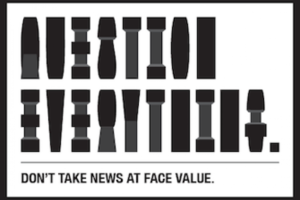 Can you read the headline on the right?
Can you read the headline on the right?
No? Good. That’s what we’re hoping. We’d like you to pause for a moment to think — and then dig a little deeper to decipher the meaning of what you’re seeing, just as you should do when determining whether the news you’re reading is real or fake.
That’s the purpose of our new ad campaign, developed as part of a pro bono partnership with J. Walter Thompson New York.
The #SeeAlltheAngles campaign features print and digital ads, a new landing page, a Headline Maker app, a downloadable keyboard and printable posters.
It is based on a sideways-facing font that JWT developed just for us — one that puts a literal spin on the alphabet and turns each letter so just its edge is visible. The font encourages readers to think beyond their first impression — and, by extension, reminds them not to take what they see at face value. It will be used in “headlines” in the advertising copy.
These ads are being placed with major news outlets, including The Wall Street Journal, Fox News and AOL. All media space has been donated by Kargo, a mobile advertising agency, and partners of JWT.
To access the tools and to learn more about the font, visit the #SeeAlltheAngles page. We encourage you to use the Headline Maker app (available for iOS and Android) and the keyboard to create your own headlines and send them as text messages. Download the posters and hang them anywhere that could benefit from a news literacy message — classrooms, libraries, after-school programs, even your kids’ rooms. And please share your photos, graphics and text messages with us by emailing them to [email protected].
One last thing: That headline on the right?
“Question everything.”
We hope you do.
Welcome news from Facebook on the fake news front
The change to its news feed that Facebook is announcing today offers a first line of defense against the spread of false stories, online hoaxes and conspiracy theories.
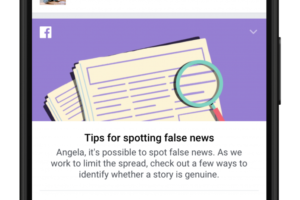 This is, no doubt, welcome news to fighters against fake news. It certainly is to us, and we’re excited to be part of this global effort.
This is, no doubt, welcome news to fighters against fake news. It certainly is to us, and we’re excited to be part of this global effort.
Starting today, people in 14 countries (including the United States, the United Kingdom, Canada, Italy, Mexico, Brazil, Indonesia, the Philippines and Taiwan) will see an “educational tool” at the top of their news feed for a few days. This tool goes to Facebook’s Help Center, where users will discover tips on preventing the spread of false information — language Facebook developed with First Draft, another news literacy organization.
It will also highlight work by other experts in the field — including the News Literacy Project.
Readers who would like to dig deeper into the issues will be directed to our site, where they’ll get our take on discerning fact from fiction and identifying what can be trusted, shared and acted on (and what shouldn’t be).
This new effort is part of Facebook’s comprehensive strategy to tackle the pernicious issue of fake news, and it complements the collaborations we’ve already established with the world’s largest social media company.
In January, Facebook announced the Facebook Journalism Project, an initiative that will provide Facebook’s worldwide audience with tools and training that promote accurate journalism and news literacy. NLP is one of the initial partners in the program, and the only one focused solely on news literacy.
Earlier this week, NLP’s president and CEO, Alan C. Miller, and Facebook’s head of news partnerships, Campbell Brown, participated in the announcement of the News Integrity Initiative — a program, based at CUNY’s Graduate School of Journalism, that brings together a global consortium of 19 academic institutions, nonprofits and individuals to collaborate on efforts that advance the cause of news literacy and improve trust in journalism. Facebook is one of the nine initial funders. Again, NLP is one of the initial partners — and, again, we’re the only one focused solely on news literacy.
And finally, as part of the Facebook Journalism Project, we’re in the final stages of working with Facebook on an ambitious public service advertising campaign that will be released on the platform later this spring.
We’re proud to be working with Facebook on all of these fronts — and we couldn’t be more excited to join Facebook, and others, in taking on the challenge to combat misinformation, spin, propaganda, hoaxes, conspiracy theories, outright falsehoods and fake news.
NLP to be founding participant in News Integrity Initiative
Today marks a milestone for the News Literacy Project. We’ve been offered an exciting opportunity to amplify and expand our work to give facts a fighting chance.
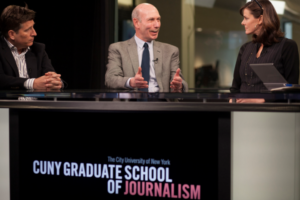 We’re honored to be a founding participant in the News Integrity Initiative, a global consortium “focused on helping people make informed judgments about the news they read and share online.”
We’re honored to be a founding participant in the News Integrity Initiative, a global consortium “focused on helping people make informed judgments about the news they read and share online.”
Based at the CUNY Graduate School of Journalism in New York, the Initiative is launching with $14 million in funding from tech industry leaders, academic institutions, nonprofits and other organizations. It will support applied research and projects and convene meetings with industry experts to advance news literacy, to increase trust in journalism around the world and to enhance the public conversation.
I will be part of today’s announcement, which will be broadcast at 4 p.m. ET via Facebook Live on the CUNY Journalism School’s Facebook page. NLP is one of 19 initial participants in the News Integrity Initiative — and is the only one focused primarily on news literacy.
NLP has been a national pioneer in the field of news literacy for nine years, providing innovative lessons and resources that give middle school and high school students the tools to know what to believe in today’s challenging information landscape.
In the aftermath of the bitterly divisive 2016 presidential campaign, which featured daily assaults on truth and partisan attacks on the news media, the world learned hard lessons about the prevalence and power of online hoaxes and conspiracy theories.
For us, the need to extend news literacy to the general population suddenly took on far greater urgency, since the bedrock of a healthy democracy is an informed and engaged electorate. Our ultimate goal is to strengthen the grass roots of our country’s democracy by giving people of all ages, and not just teenagers, the ability to know what news and information to trust, share and act on.
Even as our scope expands, we remain committed to continuing to serve our core community with our Checkology® virtual classroom, which is rapidly growing nationally and worldwide.
We are already working with Facebook on an ambitious public service advertising campaign that will be released on the platform this spring. At this crucial moment for the U.S. and the world, we’re excited by the prospect of being part of this broad and impressive coalition to improve news literacy on a global scale.
Survey shows strong, consistent gains in students’ news literacy knowledge and habits
Students who complete the News Literacy Project’s core unit report significant changes in the ways they think about, share and respond to news and information they read or watch online, new survey data indicate.
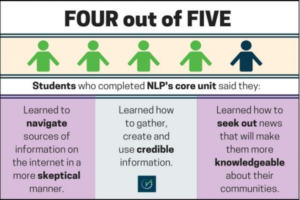 More than 80 percent of the students who responded to the survey said that the unit:
More than 80 percent of the students who responded to the survey said that the unit:
- Improved the way they gathered, used and produced credible information.
- Improved their ability to distinguish quality journalism from other types of news and information.
- Increased their ability to use news to become knowledgeable about their communities, the nation and the world.
- Learned how to exercise civility, respect and care in online communities.
“The News Literacy Project is transforming student consciousness from being insular and impressionable to worldly and critical,” said Jeff Zimmerman, technology director at Our Lady of Tepeyac High School in Chicago.
“My students have a new understanding of the ways that powerful individuals and groups seek control over information to shape public response to important issues. I believe they will carry that insight with them into college and beyond, contributing to a generation of independent thinkers.”
The results come from NLP’s 2015-16 national assessment survey. They are based on pre- and post-unit surveys of students’ attitudes, knowledge and behavior and were collected and analyzed by Anita M. Baker, NLP’s independent evaluation consultant.
The surveys have consistently showed significant changes in students’ knowledge, attitudes and behavior since NLP began administering them in 2009.
“It is difficult to overstate the importance of meaningful formal assessments of student learning,” said Peter Adams, NLP’s senior vice president for educational programs. “It’s not only vital for our teacher partners, but it helps us evaluate and improve our instructional design and resource development. It’s an irreplaceable part of our ongoing mission to provide educators with materials that help them engage and activate students as news literacy learners and citizens.”
In the most recent survey, students also reported that NLP lessons made them more likely to post a comment on a blog (40 percent), ask a news organization to correct a factual error (41 percent) and vote in a local, state or national election when they are old enough to do so (62 percent).
“The News Literacy Project has skillfully taken on the urgent mission of showing young people how to bring critical judgment to their news consumption,” said Martin Baron, executive editor of The Washington Post, one of NLP’s 33 partner news organizations.
“It’s surpassingly important work — absolutely critical to democracy and civil society.”
The Checkology® virtual classroom has gone viral worldwide
When NLP rolled out its dynamic Checkology® virtual classroom last May, our goal was to be in all 50 states with 100,000 registered students by the end of 2017.
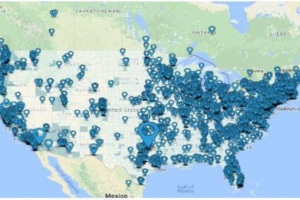 We’re just three months into 2017, and we have already enrolled 6,200 educators who teach 775,000 students in urban, suburban and rural areas throughout the United States and in at least 46 countries around the globe, from China to Turkey to South Africa to Brazil to Australia.
We’re just three months into 2017, and we have already enrolled 6,200 educators who teach 775,000 students in urban, suburban and rural areas throughout the United States and in at least 46 countries around the globe, from China to Turkey to South Africa to Brazil to Australia.
Interest surged following the presidential election and the disclosure of the prevalence and power of online rumors, hoaxes and conspiracy theories (“fake news”), accompanied by a growing national debate about the nature and value of real news. Amid increased awareness of the challenge that students face in determining what information to trust, educators have embraced the opportunity to teach core news literacy skills and concepts — including how to detect bias, how to dissect viral rumors and how to use the standards of quality journalism to find credible information.
As teachers bring news literacy to their classrooms, students are recognizing their own need to be news-literate.
“Now we need it even more,” said Catherine Dievendorf, a senior at Alta Loma High School in Rancho Cucamonga, Calif. “Consuming news and media blindly destroys our understanding and awareness of bias and deceit that could permeate our news.”
The virtual classroom includes 12 core lessons and supplemental tools that teach news literacy skills and encourages students to apply what they are learning to the news and information they encounter every day. By doing so, they develop the critical-thinking skills that are essential for informed and engaged citizens in a democracy.
The Basic version of the platform provides a single login for teachers and permits them to deliver the lessons in a one-to-many format (on an LCD projector, for example). The Premium version provides subscribers with individual student logins to unlock the full virtual classroom experience, including one-to-one delivery, self-pacing, remediation, individual assessments, points, badges and student discussion.
We’ve received feedback from teachers right from the start, and the spring pilot of the Premium version, which will extend through June, incorporates many of the changes they requested. These include making it more efficient for teachers to offer online feedback to students and giving them more options for student remediation, for blending whole class and individual instruction and for sharing announcements and notifications. We’re also updating examples of information in some lessons and improving key aspects of students’ experience.
Educators: Sign up here to participate in the spring pilot, then share this link with your fellow teachers in middle schools and high schools, librarians, and leaders of after-school programs.
NLP hires new coordinator to oversee the Checkology™ virtual classroom
John Silva, who has used the News Literacy Project’s curriculum as a history teacher in Chicago, will now be aiding other educators as NLP’s Checkology™ virtual classroom coordinator.
 The new position is the result of the explosion of interest in the virtual classroom, which was introduced in May 2016. In its first 10 months, 4,500 educators who teach 550,000 students throughout the United States and in at least 38 other countries have registered to use the platform.
The new position is the result of the explosion of interest in the virtual classroom, which was introduced in May 2016. In its first 10 months, 4,500 educators who teach 550,000 students throughout the United States and in at least 38 other countries have registered to use the platform.
“As a teacher, I saw firsthand the impact News Literacy Project had on my students and their ability to evaluate and think critically about news and online media,” Silva said. “I became an advocate for NLP among my colleagues and have used NLP curriculum for several years. I am very excited to join the NLP team and bring that curriculum to classrooms throughout the country through the Checkology™ platform.”
He comes to NLP with 13 years of experience as a history teacher with Chicago Public Schools, including seven years at Lindblom Math & Science Academy, one of CPS’s top selective enrollment schools. He began working with NLP at Lindblom, where he implemented the curriculum in his 8th-grade and 11th-grade history classes.
A U.S. Marine Corps veteran, Silva spent several years in corporate telecommunications positions before deciding to become a teacher. He graduated from the University of Illinois at Chicago with a bachelor’s degree in the teaching of history and has a master’s degree in education, with a concentration in educational technologies, from the University of Illinois at Urbana-Champaign. He became a National Board Certified Teacher in 2012.
NLP to help kick off national news literacy initiative
News literacy’s moment has arrived.
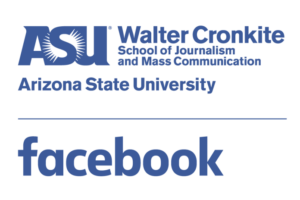 Those of us who have focused for years on the challenges to consumers created by digital media are no longer a voice in the wilderness. Recent events (especially the furor over the primacy and definition of “fake news”) have thrust our mission into the middle of myriad conversations — and have established news literacy education as an urgent national need.
Those of us who have focused for years on the challenges to consumers created by digital media are no longer a voice in the wilderness. Recent events (especially the furor over the primacy and definition of “fake news”) have thrust our mission into the middle of myriad conversations — and have established news literacy education as an urgent national need.
Our work at the News Literacy Project (NLP) offers evidence of this growing demand: In just 10 months, 4,500 educators who teach 550,000 students in every state in the U.S. (and at least 38 other countries) have registered to use NLP’s Checkology™ virtual classroom. Dozens are signing up daily.
It’s a start, but there’s much more to be done. Recognizing both the need and the opportunity, Facebook is convening a News Literacy Working Group this weekend — an initial step to help news literacy practitioners equip a far wider audience with the tools to know what to trust in the digital age.
We’re proud to be joining more than 50 educators, nonprofit leaders, journalists, funders and representatives of social media companies who will be gathering this weekend at Arizona State University’s Walter Cronkite School of Journalism to review their experiences in the field, identify research opportunities and assess projects for funding. I am hopeful that this will be the first of a series of meaningful events for this group.
This meeting is part of the broader Facebook Journalism Project — an initiative by the world’s largest social media company to combat misinformation by working with news organizations, educators and independent fact-checkers and making improvements to its platform.
As part of this initiative, we at NLP are collaborating with Facebook to produce an eight-week public service advertising campaign this spring to help stem the spread of viral rumors, hoaxes, conspiracy theories and other types of misinformation and to help give real news a fighting chance.
We’re well aware that in today’s information ecosystem, the readers, viewers and listeners are in charge. They decide what news to receive and when, where and how to access it. Moreover, they comment on it, they share it and they actively post on social media. We believe that we can help them determine the credibility of what they’re reading, watching and hearing — meaning that they will be less prone to being deceived and to deceiving others.
We also believe that only a concerted national education effort can give the public the ability to be informed, responsible and empowered consumers, creators and sharers of news and information. We are ready to take on this challenge. Nothing less than the health of the nation’s democracy is at stake.
The Checkology virtual classroom: ‘Knowledge that is desperately needed to survive in today’s world’
When Dee Burek started teaching debate at Stone Bridge Middle School in Allentown, New Jersey, six years ago, she soon noticed a trend: Her students’ arguments were riddled with inaccuracies.
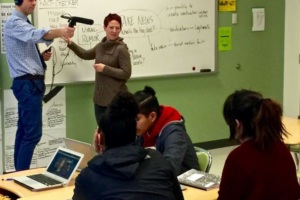
For his report on NPR, journalist Cory Turner (left) records student interaction with Wakefield High teacher Patricia Hunt as she leads a lesson from the Checkology™ virtual classroom.
No matter how many times she urged them to check their sources, the students would say, “But it’s on the internet,” “There is no author” or “It looks like a real source.”
Pushing them to delve deeper proved challenging until Burek discovered the News Literacy Project’s Checkology™ virtual classroom while researching curriculum for an upcoming journalism elective. She started piloting it with her eighth-grade journalism students in the fall — a time rife with real-world teachable moments that blended perfectly with the platform’s content.
“Just as I was teaching about citizen watchdogs, a package arrived in the mailbox of a New York Times reporter with some pages of Donald Trump’s tax return,” she said. “Then as I taught the lesson on bias, BuzzFeed released a dossier on Donald Trump. The kids were so excited to talk about it the next day and start trying to get to the truth.”
Burek was so impressed with the platform that she took one of her students to a school board meeting to advocate for its use in classrooms throughout the district.
“The Checkology™ virtual classroom has empowered my students,” she said. “Their critical-thinking skills have improved. They will leave my class with knowledge that is desperately needed to survive in today’s world.”
As news literacy is increasingly being recognized as an essential skill, teachers nationwide are finding the platform to be a seamless way to incorporate it into their existing curricula.
“The students and I are loving [the] Checkology™ [platform]!” said Patricia Hunt, a government teacher at Wakefield High School in Arlington, Va., whose participation in the fall pilot was featured in reports on NPR and on WJLA-TV, the ABC affiliate for Washington, D.C. “It has fit beautifully with our examination of the political process and focus on core democratic values. The students continually make connections to the material and learning, especially in light of the coverage and impact of fake news.”
Across the country, Liz Ramos, who teaches AP government and world history at Alta Loma High School in Rancho Cucamonga, Calif., said the platform has helped give her students “the tools to evaluate credible takes on a story, examine and understand the various purposes of news and media, and to be aware of bias and deceit by providing a framework to question the news and social media postings and be critical thinkers for reference in life moving forward.”
Reflections on the road to news literacy for all
The idea for the News Literacy Project came to me in 2006, when I spoke to my daughter’s sixth-grade classmates about what I did as a journalist and why it mattered.
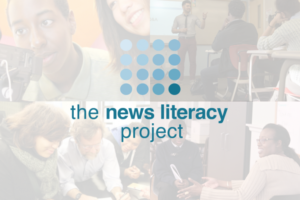 I left her middle school that day thinking that if a lot of journalists brought their expertise and experience to bear in this way, it could have a significant impact on education and on the future of journalism.
I left her middle school that day thinking that if a lot of journalists brought their expertise and experience to bear in this way, it could have a significant impact on education and on the future of journalism.
Two years later, after 21 years as a reporter, I left the Los Angeles Times and started NLP. At the time, I thought of it as moving from the supply side of journalism to the demand side.
But as we began to work in secondary schools with our classroom, after-school and e-learning programs, my perspective broadened. Increasingly, I saw our greatest benefit as strengthening the grass roots of the country’s democracy by giving the next generation the tools to know what news and information to trust, share and act on, both as students and as future voters. After all, the bedrock of a healthy democracy is an informed and engaged electorate.
From the beginning, people told me that this was a great idea — and that adults needed these skills, too. Or at least some adults: My mother-in-law, who sends me all kinds of cockamamie things she finds online, needs this. My uncle, who believes everything he hears on the radio, needs this. Or even: I need this!
But we had already undertaken an enormous mission: educating teenagers that all information isn’t created equal. We found that impressionable younger students often believed that if someone put something on the internet, it must be true. Some high school students, on the other hand, were already cynical enough to believe that all news or information is equally driven by an agenda — and, in the case of news, by personal, political and commercial bias. Some even viewed raw information — for instance, random musings in a blog post or a cellphone video uploaded to YouTube — as more reliable than a news report published or broadcast by mainstream media.
Moreover, our goal was ambitious, too: to embed news literacy in the American educational experience. In May 2016, building on all of our work since 2008, we launched our Checkology™ virtual classroom as our path to exponential growth nationwide. We were heartened to see the platform quickly gain traction in every state in the country.
Then, following a bitterly divisive 2016 presidential campaign that featured daily assaults on truth and partisan attacks on the news media, we learned about the prevalence and power of online hoaxes and conspiracy theories. The need to extend news literacy to the general population suddenly took on far greater urgency.
So NLP has embraced the opportunity to develop, with Facebook’s support, a public service ad campaign for the world’s most popular social media platform. Not only is this consistent with our mission, but it will enable us to create creative and compelling messages that take advantage of Facebook’s exceptional targeting capabilities to promote news literacy among a massive new audience of engaged adults, as well as young people.
This campaign will raise awareness of the importance of being a skeptical and responsible consumer of news and information. It will help give millions of Facebook users the ability to discern credible information from raw information, propaganda and misinformation. And it will elevate the field of news literacy and reinforce NLP’s leadership role.
We may even reach some of my daughter’s sixth-grade classmates. They’re now young adults and no doubt are getting much of their news and information from Facebook. It would be a fitting way to reconnect.
Facebook to support the News Literacy Project on public service ad campaign
Facebook is supporting a public service advertising (PSA) campaign by the News Literacy Project (NLP) that will provide Facebook users with the tools to become informed consumers of news and information and to know which sources to trust, the company announced today.
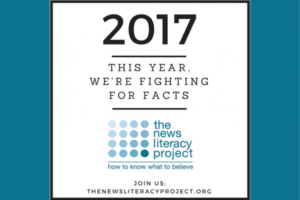 “As Facebook seeks to support journalism, we will also be working on new ways to help give people information so they can make smart choices about the news they read — and have meaningful conversations about what they care about,” Fidji Simo, Facebook’s director of product, wrote in a blog post.
“As Facebook seeks to support journalism, we will also be working on new ways to help give people information so they can make smart choices about the news they read — and have meaningful conversations about what they care about,” Fidji Simo, Facebook’s director of product, wrote in a blog post.
This effort is part of the Facebook Journalism Project, a broad initiative “designed to support quality journalism and news literacy” through partnerships with news outlets and nonprofit organizations. NLP is the only news literacy organization invited to participate.
The PSA campaign — which will include videos and other multimedia elements familiar to Facebook users — will raise awareness of the importance of being a skeptical and responsible consumer of news and information and will elevate the profile of the field of news literacy and of NLP and its programs. It will enable NLP, which to date has worked exclusively with students in middle school and high school, to extend its reach to the general public on a mass scale. Facebook has more than 1.8 billion active users worldwide.
NLP will use Facebook’s targeting capabilities to reach a wide range of users. This will allow NLP to build on the initial success of its classroom, after-school and e-learning programs, including its cutting-edge Checkology™ virtual classroom, an online platform that helps students discern fact from fiction through a range of exercises and video lessons led by prominent journalists and other experts.
“NLP welcomes the opportunity to work with Facebook to bring news literacy lessons and skills to an enormous and engaged audience,” said NLP President Alan C. Miller. “We look forward to providing Facebook users with the tools to recognize what information to trust and share and how to spot stories and posts based on false information, viral rumors and conspiracy theories.”
NLP will work with Facebook’s creative advertising team to develop the PSAs, which will appear exclusively on the social media platform during an eight-week period this spring. Facebook has retained Scot Safon, the former chief marketing officer at CNN Worldwide, to collaborate on these messages with NLP, which will have final editorial control over the content.
NLP teaches that all information is not created equal and uses the aspirational standards of quality journalism to determine what should be trusted, shared and acted on. It also fosters an understanding of the importance of the First Amendment and a free press in a democracy. NLP’s primary mission is to provide programs and resources that teach secondary school students how to differentiate credible information from raw information, misinformation and propaganda in the digital age.
In Facebook’s blog post, Simo said that the company “will work with third-party organizations on how to better understand and to promote news literacy both on and off our platform to help people in our community have the information they need to make decisions about which sources to trust. We will help organizations already doing important work in this area, such as the News Literacy Project, and bring a consortium of experts together to help decide on what new research to conduct and projects to fund.”
In addition to making a financial donation to support NLP, Facebook is providing engineering assistance from its partnership team to help NLP determine how to develop an app that will effectively support its educational work, which will remain independent of Facebook.
Facebook also said that it will expand training for journalists and will partner with news organizations to develop new storytelling formats, support local news and find ways to encourage its users to subscribe to news outlets.
The Facebook Journalism Project is the company’s second major step to address hoaxes and fake news since coming under criticism for the use of its platform as a means of spreading factually inaccurate and outright false stories during the presidential election. The company announced last month that it was making it easier for users to report suspicious posts and reducing the financial incentives for those who create hoaxes. It also launched a program in collaboration with the Poynter Institute to give independent fact-checking organizations the ability to flag suspect Facebook posts.
The News Literacy Project, a national education nonprofit, was founded in 2008 by Miller, who won the Pulitzer Prize for National Reporting in 2003 as an investigative reporter with the Los Angeles Times. NLP has delivered innovative classroom, after-school and digital programs to diverse and dynamic schools in New York City, Chicago, Houston and the Washington, D.C., area since 2009.
In May, it launched the Checkology™ virtual classroom, which is the culmination of all its work to date and its primary path to national scale. This e-learning platform, available anywhere there is an internet connection, provides students with engaging, real-world lessons that foster critical thinking skills. Leading journalists from The New York Times, The Wall Street Journal, The Washington Post, NBC News, Bloomberg and the Chicago Sun-Times are joined by experts on the First Amendment and digital media as virtual teachers and video-based guides throughout the core lessons.
More than 2,000 educators who teach more than 220,000 students in all 50 states and the District of Columbia have registered to use the platform.
Steve Schmidt, public affairs strategist and political commentator, joins NLP board
Steve Schmidt, who held top positions in two Republican presidential campaigns and serves as a political analyst on MSNBC, has joined the News Literacy Project’s board.
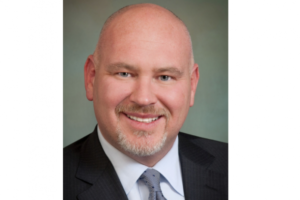 “Steve brings distinctive experience and expertise to the NLP board,” board chairman Greg McCaffery said. “His impressive skills as a public affairs and political strategist will serve us well as we seek to create the next generation of informed and engaged citizens.”
“Steve brings distinctive experience and expertise to the NLP board,” board chairman Greg McCaffery said. “His impressive skills as a public affairs and political strategist will serve us well as we seek to create the next generation of informed and engaged citizens.”
Schmidt is vice chairman for public affairs at Edelman, the world’s largest public relations agency. Topics on which he has provided counsel include telecommunications, technology, financial services, energy, health care, entertainment and gaming.
He was a top strategist on President George W. Bush’s 2004 re-election campaign and served in the Bush administration as a deputy assistant to the president and counselor to the vice president. He also played a leading role in the Supreme Court confirmations of Chief Justice John Roberts and Justice Samuel Alito, directing strategic communications for the Roberts nomination and heading the nomination team for Alito.
In 2006, Schmidt left the White House to run the successful re-election campaign of California Gov. Arnold Schwarzenegger. In 2007, he served as a senior adviser to Arizona Sen. John McCain’s bid for the Republican presidential nomination; once McCain secured the nomination in 2008, Schmidt ran the day-to-day operations for his presidential campaign.
Schmidt is the fourth highly accomplished individual to join NLP’s board in the last year. The others are David M. Marchick, managing partner at The Carlyle Group; Karen Wickre, a digital media pioneer who held senior communications positions at Twitter and Google for nearly 15 years; and Eva Haller, a respected nonprofit leader and philanthropist. Board members serve renewable three-year terms.
Leslie Hoffecker joins NLP as its first senior editor
Veteran journalist Leslie Hoffecker is joining the News Literacy Project as its senior editor.
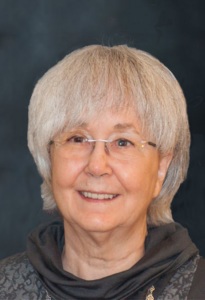 Hoffecker, a former editor at The Philadelphia Inquirer, the Los Angeles Times, Congressional Quarterly and Bloomberg, had served as NLP’s pro bono editor and Keeper of Standards since the project’s founding in February 2008. She will be the first employee to serve in the newly created staff position.
Hoffecker, a former editor at The Philadelphia Inquirer, the Los Angeles Times, Congressional Quarterly and Bloomberg, had served as NLP’s pro bono editor and Keeper of Standards since the project’s founding in February 2008. She will be the first employee to serve in the newly created staff position.
“Leslie has been an invaluable asset to NLP from Day One,” said NLP President Alan C. Miller, who worked with Hoffecker at the Los Angeles Times. “Her impressive skills as a writer and editor combined with her extensive knowledge of NLP make her a great addition at a time when we plan to dramatically raise our national profile.”
A graduate of Vassar College, Hoffecker began her journalism career as Philadelphia magazine’s copy editor — a position she obtained after noticing an unusual number of errors in an issue and writing to the editor to point them out. Her tenure at the Inquirer included a Pulitzer Prize for Local General or Spot News Reporting (as a member of the reporting and editing team that covered the Three Mile Island nuclear accident) and internal citations from the paper for her work on two other Pulitzer winners.
“I’m excited to be joining NLP full-time,” she said. “The recent furor over ‘fake news’ has only emphasized how important it is to make sure that students are taught how to know what to believe and how to share it responsibly.”
She also spent several years in Riyadh, Saudi Arabia, as a stringer for The Associated Press and the editor of a joint program of the U.S. Centers for Disease Control and Prevention and the Saudi Ministry of Health that trained Arab physicians in disease control and surveillance. In addition, she worked for two years for a boutique public relations firm in Alexandria, Va., where she edited materials as varied as annual reports and communications strategies for U.S. government agencies and social media posts for nonprofits.
Hoffecker, Miller said, “will give NLP the capacity to create and share more content on social media and elsewhere to help meet the growing demand for news literacy education.”
What you were reading in 2016
As we reflect on 2016, we look back at some of our social media posts that you liked most.
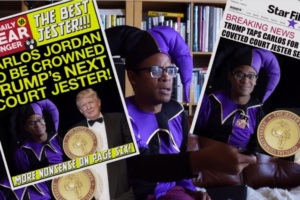
We’re sharing your top five favorites for one more read:
Pew study shows Americans take fake news problem seriously
A survey released by the Pew Research Center today shows that fabricated news stories are causing members of the public to be confused about basic facts.
About two in three U.S. adults say that fake news has caused “a great deal of confusion about the basic facts of current events,” while roughly another quarter say it causes them “some” confusion.
Despite this confusion, 84 percent of those surveyed reported that they felt a degree of confidence in their ability to spot fake news when they saw it.
“What’s encouraging about these findings is the fact that so many Americans are aware that fake news is a serious problem,” said Peter Adams, NLP’s senior vice president for educational programs.
“But given what we also know about the power of fake news, it seems clear that this is something people need to continue to pay close attention to, no matter how confident they might be in their ability to catch it.”
We have been working to address misinformation — including viral rumors, hoaxes, propaganda and other forms of fake information — in classrooms for years. Our Checkology™ virtual classroom offers lessons to help students think critically about what they’re reading online, including a unit on “immunizing” themselves from viral rumors. It provides a “Check Tool” to help students develop news-literate habits of mind.
We are also tackling the problem of fake news head on. We have created a tip sheet for students called “Ten Questions for Fake News Detection,” and we’re working on a guide for the general public. “Fake News: A Guide — Tools, Tips and Resources to Combat Misinformation Online” will be available to the public in coming days.
We recognize that many outlets, too, are working to fix the problem. Facebook’s announcement today of plans to work with fact-checking groups to tackle fake news is a step in the right direction.
But we firmly believe that news literacy education is the best long-term solution to the problem.
NLP brings much-needed news literacy training to NCSS at a critical time
Peter Adams, NLP’s senior vice president for education programs, led a workshop on how educators can use authentic examples of viral rumors to drive civic learning and engagement.
The session couldn’t have come at a better time. With little regulation or controls, social media platforms occupy a greater and greater space in the public attention zone. And after a divisive presidential campaign where rumors, innuendoes and outright lies often competed for air time with conventional political rhetoric, educators are grappling with ways to address the spread of fake news and looking to engage their students’ critical thinking.
“Disinformation is getting better and sneakier,” Adams said during the session. “The good news is that the tools to check it out are getting better and more plentiful.”
Adams then joined Washington Post reporter Krissah Thompson and Steven Becton of Facing History and Ourselves for a panel discussion about the critical role of credible information in a robust democracy, through the lens of the news and information that appeared following the 2014 shooting of Michael Brown in Ferguson, Missouri. Adams talked about confirmation bias, in which people interpret or recall information in a way that confirms pre-existing beliefs and ideas.
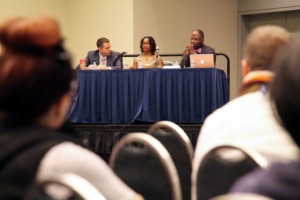
“Our feelings congeal almost immediately,” Adams said when describing a phenomenon that is also known sometimes as confirmatory bias or myside bias. “Then our rational mind sets about justifying why we have the feelings we have.”
NLP partnered with Facing History to develop “Facing Ferguson: News Literacy in a Digital Age,” an educational resource examining the information aftermath of the shooting of Michael Brown and the protests that followed, which became a flashpoint for discussion about race, policing and justice.
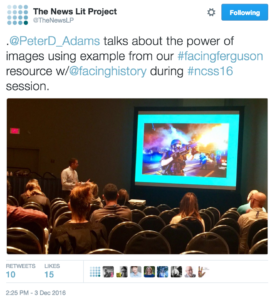 Adams and Becton also led a session introducing and exploring the resource.
Adams and Becton also led a session introducing and exploring the resource.
Teachers who stopped by NLP’s booth at the conference on Friday had the chance to meet three of the NLP journalist fellows featured in the Checkology™ virtual classroom. James Grimaldi of The Wall Street Journal, who appears in a lesson on the watchdog role of journalists in American democracy, Tracie Potts of NBC News Channel, who guides students through a lesson on filtering information according to its primary purpose, and Matea Gold of the Washington Post, who hosts a lesson on viral content, were all on hand to meet teachers.
The conference closed with a keynote panel, “Demasclerosis: The Challenge of Moving America Forward in a Hyper-Partisan Age,” produced by NLP and moderated by longtime broadcast journalist and NLP journalist fellow Ray Suarez, and featuring two of the nation’s leading columnists and commentators, Ruth Marcus and Michael Gerson, both of The Washington Post.
“You need citizens who show civility, empathy and discernment about the truth,” Gerson said. He encouraged the hundreds of educators in the room to teach citizenship because, more than ever, they are “on the front lines of defending the American ideal.”
The audience of hundreds of social studies teachers from around the country responded with a standing ovation.
Chris Wallace: ‘News literacy in the 21st century is literacy’
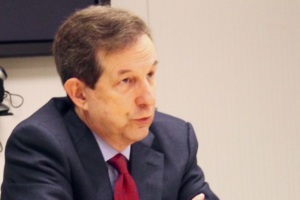 The 52-year veteran of the broadcast industry added, “News literacy in the 21st century is literacy.” And, he continued, “Knowing how to consume and judge the news is as important today as reading, writing and arithmetic.”
The 52-year veteran of the broadcast industry added, “News literacy in the 21st century is literacy.” And, he continued, “Knowing how to consume and judge the news is as important today as reading, writing and arithmetic.”
Wallace, moderator of the third presidential debate between Donald Trump and Hillary Clinton in October, also discussed President-elect Trump’s relationship with the news media, his own role as a Sunday talk show anchor and his experience working at Fox News for the past 13 years.
Wallace said he was not concerned with Trump’s efforts to bypass the press through the use of Twitter and social media, which he called “the wave of the present.” He noted that President Obama has a sophisticated program to communicate through social media as well.
But he acknowledged that the relationship between Trump and the news media will remain “contentious.” Trump was fiercely critical of the mainstream media throughout the campaign and has continued to attack it as president-elect.
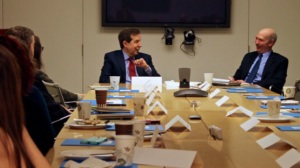 “We’re big boys,” Wallace said. “You try to work your way around it.”
“We’re big boys,” Wallace said. “You try to work your way around it.”
Trump, he noted, is hardly unique among politicians in making false statements. “They all lie. They all spin,” he said. “Trump may be more egregious. It may be on an order of magnitude. But it’s not night and day” compared to candidates and officeholders.
“I view my job as being the cop on the beat and trying to separate fact from fiction,” he said.
Wallace spent 14 years at ABC News, holding several high-profile positions, and at NBC News as a White House correspondent for seven years before joining Fox News in 2003. He said he has not experienced any more partisan pressure at Fox than at the other networks and has complete freedom to choose his guests and how he will interview them.
When it comes to the public’s reaction to his interviews, he said, “My sweet spot is to be equally condemned by both sides.” This has run the gamut from being called “a Communist” to “a right-wing sellout” whose father, longtime CBS newsman Mike Wallace, “must be spinning in his grave.”
Though he does not begrudge Trump his tweets, Wallace said he does not use the platform. “I figure I already have enough ways to blow up my career,” he quipped.
Alan Miller’s statement on Stanford’s study about students and fake news
“The News Literacy Project has been working with educators for the past eight years to teach middle school and high school students how to address the challenges reflected in the Stanford study,” said NLP founder and CEO Alan C. Miller.
“Our Checkology™ virtual classroom features lessons to help students determine what is credible news and information on social media and elsewhere.
“It is more important than ever that the next generation has the tools to become informed and engaged citizens in the nation’s democracy.”
Christian Armstrong: ‘We prioritize news literacy over all else’
Christian Armstrong grew up in the same housing projects where Michelle Obama had lived as a young girl — a notoriously dangerous section of Chicago’s South Side now known as O Block. He never read a newspaper, watched the news on television or listened to it on the radio.
“I figured it had nothing to do with me,” he said.
It was like that for him in his daily life, too. He woke up, he said, to the violence in the city’s streets, to people who were hungry and had hard lives, to the police who were charged with keeping the community safe but didn’t seem to do so. In his mind, there was nothing he could do about it; powerless, he floated through life, surviving rather than living.
Then, last year, Christian enrolled in Leo High School’s semester-long news literacy class, which prepares students in the all-boys Catholic school to work on the school newspaper. Bill Figel, a co-teacher, weaves the News Literacy Project’s original curriculum into the class.
Soon, Christian began reading the Chicago Tribune every day and tackling daily news-related assignments. He began thinking about such things as media coverage of shootings in Chicago, Sean Penn’s Rolling Stone interview with a fugitive Mexican drug lord, and the presidential election. Students in the class were tweeting questions to a Chicago Tribune columnist — and were surprised when he tweeted back.
Christian was also learning what to believe and what not to believe by looking for bylines, statistics and other verifiable information, and by checking his own biases. He was getting the gist of it, he said. “But it was baby steps for me.”
Even so, Figel said, “he showed a real strength and ability to take a stand. … One could sense enlightenment driving Chris as he realized he was finding himself in his expression of the issues.”
Then one day Figel asked the students to put themselves in a story: What if you were a person in a position of power? What would you want written about you? What if something happened to you, an everyday Joe? What would be said?
Something in that clicked for Christian. News did matter. News was now about, and for, him. “We are the ones who live here,” he said. “We matter as citizens.”
Earlier this year, Christian, now 18, recalled his experience in the news literacy class during an NLP VIP breakfast featuring ESPN’s Michael Wilbon. Tall and thin, like a yard-long bean in a pressed shirt and striped tie, he spoke softly — yet with impressive poise and confidence — about his newfound sense of engagement and empowerment.
“This class has definitely changed my life,” Christian said. “We prioritize news literacy over all else. The newspaper is considered to be our Holy Grail.”
Help us give facts a fighting chance on #GivingTuesday
#GivingTuesday is less than a week away, and we’re looking forward to joining in for the first time!
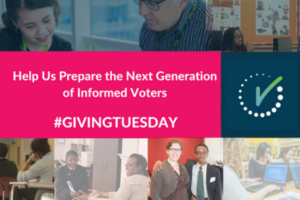
The outpouring of support we’ve seen for news literacy since the presidential election underscores the importance of ensuring that young people learn how to know what to believe. With this knowledge, they will become smarter news consumers today and better-informed and engaged citizens tomorrow.
These skills have never been more urgently needed. Just this week, a Stanford University study of more than 7,800 students in middle school through college revealed that most were unable to judge the credibility of the news and information they consumed online.
For the past eight years, we’ve been working with educators in New York City, Chicago, the Washington, D.C., area and Houston to teach middle school and high school students how to address the challenges reflected in the Stanford study. With the aid of seasoned journalists who visit their classrooms, students have learned how to evaluate the credibility of information, stem the flow of misinformation, step out of their filter bubbles, evaluate the degree of bias in what they’re reading or watching, and understand and appreciate the essential roles of the First Amendment and freedom of the press in our democracy.
Now, with our new Checkology™ virtual classroom, we can offer these lessons — and more — across the U.S., in a cutting-edge format accessible by schools, libraries and after-school programs.
With your help, we can play an even more significant role in addressing the education gaps that were starkly revealed in the Stanford study.
So we’re asking you to help us this #GivingTuesday. Here are a few ways you can join our cause:
- Plan to make a donation on Nov. 29 — or, if you prefer, do so today. As little as $20 can bring our virtual classroom to a student in an underserved school.
- Follow us on Twitter at @TheNewsLP and on Facebook, and ask your friends to follow us, too.
- Forward this email to anyone you know who believes that news literacy can make a difference.
We invite you to help us give facts a fighting chance. Thank you for your support.
Gwen Ifill, highly respected journalist and NLP board member, dies at 61
Ifill was the award-winning moderator and managing editor of 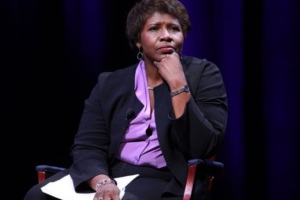 Washington Week on PBS and co-managing editor and co-anchor of PBS NewsHour. She covered the presidential campaign and the political conventions this year while quietly battling cancer until going off the air in recent weeks.
Washington Week on PBS and co-managing editor and co-anchor of PBS NewsHour. She covered the presidential campaign and the political conventions this year while quietly battling cancer until going off the air in recent weeks.
“Gwen was one of the greatest journalists of our generation,” said Don Baer, chair of both the NLP and PBS boards. “She was a true national treasure. The measure of Gwen’s impact went far beyond her professional achievements. She was a generous, kind, warm soul and a thoughtful, constant friend. Everyone whoever knew her, whoever worked alongside her, who ever was touched by her genuine kindness will miss her. I know I will.”
NLP President Alan C. Miller said, “We were honored to have had the opportunity to work closely with Gwen on a cause to which she was deeply committed. She was a relentless advocate for news literacy, an extraordinary journalist and a treasured friend.”
Ifill joined PBS in 1999, becoming the first woman — and the first African-American — to serve as moderator of Washington Week. She previously was the chief congressional correspondent and a political correspondent for NBC News, White House correspondent for The New York Times and a local and national political reporter for The Washington Post.
She was a senior correspondent for PBS NewsHour until August 2013, when she and Judy Woodruff were named the show’s co-anchors and co-managing editors — marking the first female co-anchor team of a network news broadcast.
A smart, thoughtful and probing reporter, interviewer and analyst, Ifill covered seven presidential campaigns. She moderated vice presidential debates in 2004 and 2008, and she and Woodruff moderated a Democratic primary debate between former Secretary of State Hillary Clinton and Sen. Bernie Sanders in February. Her best-selling book, The Breakthrough: Politics and Race in the Age of Obama, was published on President Barack Obama’s inauguration day in 2009.
Ifill’s work was widely praised and much honored. In 2015 she was presented with the National Press Club’s highest honor, the Fourth Estate Award. She also was honored by the Radio and Television News Directors Association, Harvard University’s Joan Shorenstein Center and the National Association of Black Journalists. A native of New York City, she was a graduate of Simmons College and received nearly 30 honorary degrees.
An active member of NLP’s board since 2011, she served on the governance committee, playing a key role in vetting numerous board candidates, and was instrumental in deciding to approach an outstanding group of individuals who make up more than half the current board. She pushed to seek members who would bring expertise, experience, diversity and a strong commitment to NLP’s mission.
She never missed an opportunity to talk about NLP and news literacy in her numerous speeches and public appearances, most recently at an event at the Newseum on her birthday in September.
She also participated in several NLP events, including “Race and Politics in the Age of Obama” at Walt Whitman High School in Bethesda, Maryland, in 2009; the kickoff event for NLP’s expansion into the District of Columbia at E.L. Haynes Public Charter School in 2012; and a forum on “America’s Changing Role in the World and How the Press Covers It” at George Washington University in 2013.
Andrea Mitchell, chief foreign affairs correspondent for NBC News, and Thomas Friedman, foreign affairs columnist at The New York Times, both agreed to participate in that 2013 event at Ifill’s invitation. As Mitchell said that evening: “Nobody says ‘no’ to Gwen Ifill.”
Baer, who worked with Ifill over three decades, said about her contribution to NLP: “She embodied the very best about the mission of this organization. We will carry on in the way Gwen would have wanted, especially in these times that demand even more in terms of news literacy from every person in this country. She will always be an inspiration to us.”
2016 presidential election underscores the need for news literacy
Meanwhile, the press, polls and pundits proved to be stunningly wrong in crafting the narrative of this election and appeared out of touch with broad swaths of voters. Partisans on all sides displayed intense hostility to, and distrust of, the news media.
Amid this fractured civic discourse, it is more vital than ever that the next generation be taught how to discern credible, verified information from raw information, spin, misinformation and propaganda. It is essential that young people understand the role of the news media and the First Amendment in a democracy.
The News Literacy Project remains more committed than ever to this mission. As always, we appreciate your support and participation in this important cause.
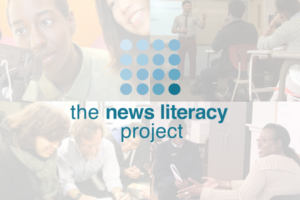
Eva Haller, a luminary in the nonprofit world, joins the News Literacy Project board
“Eva brings a wealth of experience in both the business and nonprofit worlds to the project’s board at just the right moment,” said NLP board chair Don Baer. “We welcome her expertise as we raise our profile and expand our reach.”
Haller, who as a teenager in Nazi-occupied Hungary was active in the resistance, has held leadership roles in nonprofits in New York City and elsewhere. For the last three decades, she and her husband, Dr. Yoel Haller, have been devoted to social, educational and environmental activism and philanthropy.
Earlier in her life, she was a co-founder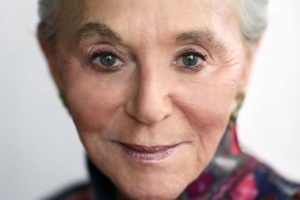 of the Campaign Communications Institute of America, a highly successful consulting firm that revolutionized the use of telephone marketing by Fortune 100 companies and political campaigns.
of the Campaign Communications Institute of America, a highly successful consulting firm that revolutionized the use of telephone marketing by Fortune 100 companies and political campaigns.
Haller said she was drawn to NLP’s mission after meeting Miller three years ago. She and her husband have attended several NLP events in New York City and have supported NLP in a variety of ways.
“In Nazi Hungary there was no freedom of speech, and in Soviet-occupied Budapest there was no freedom of thought,” Haller said. “In America today we desperately have to retain, maintain and encourage critical thinking and the courage of our convictions. Therefore, we must protect and grow the News Literacy Project, because news literacy is our most precious insurance against totalitarian slavery of thought.”
Haller has been honored with the Mandala Award for Humanitarian Achievement in 2011 (presented by the Rubin Museum of Art in New York City), the inaugural Award for Excellence in Mentoring at Forbes’ Power Redefined Women’s Summit in 2013, and a Lifetime Achievement Award by the United Nations Population Fund in 2013. More recently, she was named a visiting professor at Glasgow Caledonian University, where she received an honorary doctorate and was awarded the 2014 Magnusson Fellowship.
For more than 17 years, she was board chair of Free the Children USA (now part of WE Charity), a high-profile organization that partners with communities to work from within to break the cycle of poverty.
She is a trustee of the Rubin Museum of Art and the University of California Santa Barbara Foundation. She also serves on the boards of the Creative Visions Foundation, which uses arts, media and technology to ignite positive social change; Sing for Hope, which promotes the power of the arts in under-resourced areas by, among other things, placing 88 pianos on the streets of New York City each year; Video Volunteers, which uses video to give a voice to India’s “untouchables” caste and other unheard communities; Asia Initiatives, which supports the economic empowerment of poor women and their families in South Asia; and A Blade of Grass, which promotes socially engaged art across the United States.
She previously was on the boards of the Jane Goodall Institute and Women for Women International. In 2015 she was appointed to the Prince’s Charities Canada Advisory Council, which promotes the charitable work of the Prince of Wales.
David Gonzalez receives NLP’s John S. Carroll Journalist Fellow Award
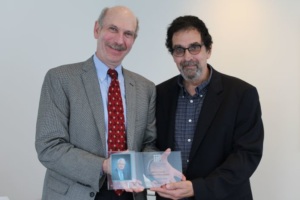
Gonzalez, a reporter, photojournalist and editor at the Times for 27 years, delivered the News Literacy Project’s first journalist lesson in 2009 and has been a mainstay of NLP ever since. He has led numerous lessons in multiple schools in New York City, has appeared in NLP videos and publications, has been featured in virtual visits or videoconferences connecting students across the country and has participated in NLP events.
In the process, he has become a powerful role model for students — and a favorite of educators and NLP staff.
“It has been a great pleasure to do this,” Gonzalez said upon accepting the award. “I’ve always thought of it as enlightened self-interest. This is the next generation of readers, critical readers.”
He said he was honored to receive an award named for Carroll. “For my generation,” he said, “he’s one of the greats.”
Gonzalez is one of two recipients of the inaugural John S. Carroll Journalist Fellow Award, presented in honor of the revered former newspaper editor and chairman of NLP. Matea Gold, a national correspondent with The Washington Post, received the award during a dinner in August.
Among those attending the luncheon last week was Dean Baquet, the executive editor of The New York Times. As editor of the Los Angeles Times, Carroll hired Baquet as his managing editor in 2000. Baquet, who described Carroll as “almost like a father to me,” told Gonzalez that “he would have been thrilled to honor you.”
Miller said that in addition to Gonzalez’s numerous contributions to NLP, his work as a journalist reflects values that Carroll epitomized: “integrity, a sense of public service, compassion and a deep commitment” to telling stories “with insight, accuracy, eloquence and fairness.”
Along with honoring individual achievements, the award recognizes the contributions of more than 400 journalists who have collectively delivered more than 700 lessons in person and virtually since 2009. Gonzalez and Gold were selected by acommittee of NLP board members and staff; each received $500 and a glass plaque with an etched photo of Carroll.
Also attending the luncheon were Geraldine Baum, the chair of NLP’s New York advisory committee; Hannah Yang, a vice president at the Times and a New York advisory committee member; and Darragh Worland, NLP’s vice president for digital media. Baum, Miller and Gold worked with Carroll and Baquet at the Los Angeles Times.
Carroll, a founding member of NLP’s board, died June 14, 2015, at the age of 73. He was one of NLP’s first two board members, served four years as its chairman and remained on the board until his death.
He was the editor of the Los Angeles Times from 2000 to 2005, during which time the paper won 13 Pulitzer Prizes. He also was the editor of The Baltimore Sun (1991-2000) and the Lexington (Kentucky) Herald-Leader (1979-1991). He served on the Pulitzer Prize board from 1994 to 2003 and was its chairman in 2002.
Knight grant to help NLP expand reach of its virtual classroom to help students learn what information to trust
Today Knight Foundation is announcing $225,000 in support for the expansion of the News Literacy Project’s Checkology™ virtual classroom in the Knight communities of Charlotte, North Carolina; Detroit; Lexington, Kentucky; Miami; and Philadelphia.
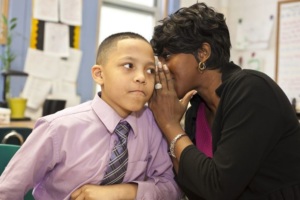 Younger students have a propensity to trust what they see: After all, it wouldn’t be on the internet if it wasn’t true. By the time students reach high school, they are often far more cynical — believing that everything they read, see or hear is driven by personal, commercial or political bias or agenda.
Younger students have a propensity to trust what they see: After all, it wouldn’t be on the internet if it wasn’t true. By the time students reach high school, they are often far more cynical — believing that everything they read, see or hear is driven by personal, commercial or political bias or agenda.
I founded the News Literacy Project eight years ago to teach middle school and high school students that all information is, in fact, not created equal. We work with educators and journalists to teach young people how to know what to believe — giving them the critical thinking skills they need to discern credible information from opinion, spin, advertising and propaganda, and to become informed, engaged participants in our democracy.
In May, we launched our innovative Checkology™ virtual classroom, the culmination of all our classroom and digital programs and our primary path to national scale. As we strive to embed news literacy in the American educational experience, we are excited that with the support of Knight Foundation, we will be expanding the platform’s reach to at least five Knight communities during the 2016-17 school year.
The virtual classroom, which is already being used in 34 states to reach thousands of students, represents an opportunity to bring news literacy to an exponentially larger number of students nationwide. With Knight’s support, the News Literacy Project will focus primarily on underserved communities in these five Knight cities: Charlotte, North Carolina; Detroit; Lexington, Kentucky; Miami; and Philadelphia. The News Literacy Project aspires to extend the platform’s reach to at least 100,000 students in all 50 states by the end of 2017.
The Checkology™ virtual classroom features a diverse group of prominent journalists and other experts who lead highly interactive lessons on such topics as discerning the credibility of information, assessing viral rumors, analyzing bias and understanding the role of algorithms. Other lessons focus on the importance of the First Amendment and the watchdog role of a free press.
Since 2009, when we began our classroom programs with support from Knight Foundation, our quantitative and qualitative assessment data have shown that students who complete our units become more frequent consumers of news; establish increased respect for the First Amendment and the press’s role in a democracy; and gain greater confidence in their ability to consume and create credible information.
At a time when faith in the news media has hit new lows — a Gallup survey sponsored by Knight Foundation and the Newseum Institute found that 55 percent of college students have little or no trust in the press to report the news accurately and fairly — we value the opportunity to rejoin forces with Knight to create a news-literate next generation.
Together, we believe that we will have a dramatic impact on education, the future of quality journalism and the health of the nation’s democracy.
Need a laugh this election season? Join the News Literacy Project’s ‘Satire Summit 2016’
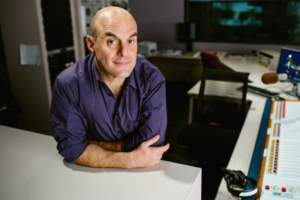
Join the News Literacy Project and a panel of prominent journalists and entertainers for “Satire Summit 2016: Beyond Parody?” — a night of jokes, jabs and a deeper look into the growing role of political satire in the news.
A cast of comedy’s brightest stars, all of whom are serious about satire and its impact, will be on hand at The New School’s John L. Tishman Auditorium, 63 Fifth Ave. in New York City, from 7:30 to 9 p.m. on Friday, Oct. 14.
The event — co-sponsored by WNYC and The New School — is the brainchild of Peter Sagal, host of the NPR quiz show Wait, Wait… Don’t Tell Me! and a Satire Summit panelist. He will be joined byAlexandra Petri, author of The Washington Post’s ComPost blog and a weekly political satire column; Jordan Carlos, a Comedy Central writer formerly with The Nightly Show with Larry Wilmore; and Chad Nackers, the head writer for The Onion. Brian Stelter, the host of CNN’s Reliable Sources, is the moderator.
“We look forward to an evening that is as informative as it is entertaining,” said Alan C. Miller, NLP’s president and CEO. “We could not imagine better timing for such a talented group to tackle this topic.”
The panelists will reflect on the growing role of political humor in calling out hypocrisy, mendacity and venality in our nation’s public life, and in holding the powerful, including the news media, accountable.
After all, as Sagal suggested, “What could be more fun than a bunch of comedians sitting around talking about something serious?” At NLP, we think the answer is: Not much.“Many of today’s students connect to the news through political satire,” Miller said. “We view the Satire Summit as a timely and engaging way to explore these connections in the context of a presidential campaign that has elevated the role of political humor to new heights.”
Tickets for the Satire Summit 2016 are available for purchase; discounts are available for students and people 62 and older. Follow along and join in on the excitement at #satiresummit16.
Matea Gold and David Gonzalez win NLP’s inaugural John S. Carroll Journalist Fellow Award

That afternoon, David Gonzalez of The New York Times became the first NLP journalist fellow to deliver a lesson. He urged enthralled eighth-grade history students at the Brooklyn middle school to tell the story of their neighborhoods because if they didn’t, someone else would — and might not get it right.
Gold and Gonzalez have been with us from the start, and remained deeply involved with NLP. Hence, it is fitting that they are the recipients of the inaugural John S. Carroll Journalist Fellow Award, presented in honor of the revered former newspaper editor and chairman of NLP.
The award also recognizes the contributions of more than 300 journalists who have collectively delivered more than 600 lessons in person and virtually since 2009.
“David and Matea epitomize the invaluable contributions of scores of journalist fellows who are at the heart of NLP’s success,” said Alan C. Miller, NLP’s founder and president. “We are delighted to recognize the expertise, experience, skill and commitment that they have generously shared with our teachers and students, and to honor John’s memory as well.”
The two were selected by a committee of NLP board members and staff; each will receive $500 and a glass plaque with an etched photo of Carroll. Maggie Farley, the chair of NLP’s D.C. advisory committee, and her husband, Marcus Brauchli, sponsored the initial awards.
Together, Gold and Gonzalez have delivered numerous lessons, led virtual visits, appeared in videos and participated in events. Gold has written about NLP and leads a lesson in its new Checkology™ virtual classroom; Gonzalez introduced NLP to key school partners in New York. Both are favorites of teachers, students and NLP staff.
Gold, now a national correspondent at The Washington Post, received her award in July during an NLP staff retreat dinner in Bethesda, Maryland, attended by Lee Carroll, John’s widow. The former editor of the Los Angeles Times, The Baltimore Sun and the Lexington (Kentucky) Herald-Leader died in June 2015.
Gonzalez, who has held positions as a reporter, a photojournalist and an editor during 27 award-winning years at the Times, will receive his award at a lunch in New York this fall.
“We just have to get the next generation to understand that what we do is so valuable,” Gold said about her commitment to NLP upon receiving the award. “This is the answer.”
News Literacy Project welcomes two exceptional board members
“Dave and Karen bring exceptional experience to NLP at an important time in our development,” said board chairman Don Baer. “They will make a strong and engaged board even better.” Marchick joined in June; Wickre did so earlier this month.
Marchick is also global head of external affairs at The Carlyle Group, where he serves on the management committee. A former partner at the Washington law firm Covington & Burling, he served in several positions during President Bill Clinton’s administration, including as deputy assistant secretary of state.
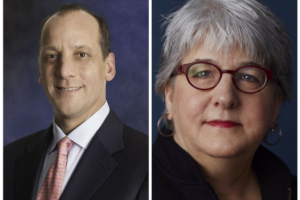 He is chairman of the board of the Robert Toigo Foundation, which supports diversity in the financial services industry.
He is chairman of the board of the Robert Toigo Foundation, which supports diversity in the financial services industry.
“I am pleased to join the NLP board and support the organization’s mission and [NLP president and founder] Alan Miller’s vision,” Marchick said. “Helping young people become interested in news and savvy consumers of it is a worthy and important objective, and I look forward to helping advance NLP’s work.”
Wickre describes herself as a “communications strategist, sounding board, channeler of ideas and connector of people.” She formed KVOX Media, a communications consulting firm catering to business clients, in early 2016.
As editorial director at Twitter for more than four years, she oversaw internal and corporate marketing communications and managed more than 20 global blogs, 200 Twitter accounts and other public content channels and sites. She joined Twitter in 2011 from Google, where for nearly a decade she was senior media liaison and worked on global communications and public affairs. Earlier in her career Wickre worked at Studio Archetype, Upside and Ziff Davis.
“There’s never been a greater need to separate fact from fiction, especially for the generation coming up,” Wickre said. “I’m very pleased to join the board of NLP, whose mission of empowerment and education could not be more important today.”
Wickre is one of the founders of Newsgeist, an annual “un-conference,” supported by Google and the Knight Foundation, that encourages new approaches to the delivery of news and information. She is also a board member of the International Center for Journalists.
Alison R. Bernstein, education leader and senior NLP board member, dies at 69
 “She won many battles: for gender equality, humanity in the arts, truth in history, and human rights. She lost the one against cancer,” according to a death notice published in The New York Times.
“She won many battles: for gender equality, humanity in the arts, truth in history, and human rights. She lost the one against cancer,” according to a death notice published in The New York Times.
“We are heartbroken,” said NLP President Alan C. Miller. “Alison was an early champion of news literacy, an invaluable board member and a smart, gracious and thoughtful friend.”
Bernstein had headed the Institute for Women’s Leadership at Rutgers University since 2011. She oversaw eight programs exploring and advancing women’s leadership in education, politics, science, the arts and the workplace. She previously served as vice president for education, creativity and free expression at the Ford Foundation, where she directed the foundation’s work in the United States and internationally in the fields of education and scholarship, arts and culture, media, religion and sexuality. She joined the foundation in 1982 as a program officer.
At Ford, Bernstein’s support was instrumental in the foundation’s early funding of the News Literacy Project and Stony Brook University’s Center for News Literacy. She joined NLP’s board shortly after leaving the foundation in 2011 and subsequently became chair of its governance committee.
She played a key role in vetting numerous board candidates and was instrumental in deciding to approach an outstanding group of individuals who make up more than half the current board. She pushed to seek members who would bring expertise, experience, diversity and a strong commitment to NLP’s mission.
She also suggested that NLP honor its late board chairman, John S. Carroll, by creating a journalist fellow award to recognize the outstanding contributions of some of the project’s many volunteer journalist fellows. The first two winners will be announced this month.
Bernstein was born June 8, 1947. A graduate of Vassar College, she received an M.A. and a Ph.D. in American history from Columbia University. She taught at five colleges and universities and served as associate dean at Princeton University.
She was the author or co-author of four books: American Indians and World War II: Towards a New Era in Indian Affairs, The Impersonal Campus, Melting Pot and Rainbow Nations: Conversations About Differences in the United States and South Africa and Funding for the Future: Philanthropy in Higher Education.
An advocate for the rights of women and minorities throughout her career, she considered one of her proudest achievements the creation of the Gloria Steinem Endowed Chair in Media, Culture and Feminist Studies at Rutgers, helping to raise more than $2 million toward an initial endowment of $3 million.
“Alison was a giant in her field and shared her insights to the very end,” said Terry Peterson, chairman of the national Afterschool Alliance and a founding member of NLP’s board. “What a big loss.”
Remembering John Carroll: An iconic newspaper editor and the News Literacy Project’s guiding light
John S. Carroll, the revered newspaper editor and a founding member of NLP’s board, died June 14, 2015, at the age of 73. He was one of NLP’s first two board members, served four years as its chairman and remained on the board until his death.
“To this day, John’s spirit, values and impeccable standards are reflected in everything we do,” said NLP President Alan C. Miller. “He was excited about the prospect of moving to national scale. I believe he would be enormously gratified to see how far we’ve come since we lost him — far too soon.”
Carroll was the editor of the Los Angeles Times from 2000 to 2005, during which time the paper won 13 Pulitzer Prizes. He also was the editor of The Baltimore Sun (1991-2000) and the Lexington (Kentucky) Herald Leader (1979-1991). He served on the Pulitzer Prize board from 1994 to 2003 and was its chairman in 2002. Earlier in his career he was a reporter at The Sun and metro editor at The Philadelphia Inquirer.
During Carroll’s memorial service in Lexington, Dean Baquet, whom Carroll hired as his managing editor in Los Angeles, quoted a former colleague who said that watching Carroll edit was “like watching Willie Mays play baseball.” Baquet, who is now executive editor of The New York Times, recalled Carroll’s abiding belief in “the honor and power of journalism.”
Norm Pearlstine, a classmate of Carroll’s at Haverford College and the chief content officer at Time Inc., called him “our generation’s best, most respected, best-loved newspaper editor.”
NLP is honoring Carroll’s memory through classroom and digital programs supported by a memorial fund and with an annual award to recognize the valuable contributions of the project’s volunteer journalist fellows.
Two classroom units are being dedicated to Carroll, as are more than 1,000 seats in the spring pilot for the project’s Checkology™ virtual classroom, which launched May 2 and is NLP’s primary path to national scale. Both the classroom and digital programs focus on underserved communities.
The first classroom unit was completed in the fall of 2015 in Silver Spring, Maryland; the second unit, in the fall of 2016, will take place in Chicago. The virtual classroom seats are spread across schools in Arizona, California, Connecticut, Indiana, Massachusetts, Michigan, Montana, New Jersey, Rhode Island, Virginia and Washington.
As their final project for the first classroom unit, students at Montgomery Blair High School in Silver Spring wrote letters to Lee Carroll, John’s widow, thanking her and describing the value of their experience with NLP. Miller and reporter David Willman, who both won Pulitzer Prizes while working closely with Carroll at the Los Angeles Times, delivered lessons focusing on investigative reporting overseen by the highly respected editor.
“Your esteemed late husband, John Carroll, has left a legacy that will not be forgotten by the world,” Laura Espinoza, a 10th-grade student, began her letter. “It’s inspiring to meet someone who helps you grow as a person and a professional. Your husband was that person to many people.”
NLP also plans to honor Carroll by recognizing the outstanding contributions of one or more of its journalists annually. The winner or winners of the first John S. Carroll Journalist Fellow of the Year Award will be announced this summer.
Volunteer journalist fellows have been a key to NLP’s success from the start, bringing their distinctive real-world expertise and experience into the project’s partner schools. There are nearly 300 journalists in NLP’s online directory; collectively, they have delivered more than 600 lessons, in person and virtually, since 2009.
This year, in an extension of Carroll’s involvement with the Pulitzer Prizes, NLP is partnering with the Pulitzer Prize Centennial’s year-long celebration. Two of the project’s students from a school in Brooklyn asked thoughtful questions of Pulitzer Prize administrator Mike Pride during the announcement of the 2016 prizes at Columbia University in April. All three newspapers that Carroll edited won Pulitzers during his time there, and as metro editor in Philadelphia he directed reporting that won the awards in two consecutive years. His father, Wallace Carroll, a widely admired newspaper editor, also served on the Pulitzer board.
Carroll joined NLP in late 2007 as one of its first two board members and was elected chairman on Jan. 1, 2011. He skillfully, tirelessly and selflessly led the board and NLP through a period of dramatic success and growth before stepping down on Dec. 31, 2014.
“For me, being chair has been an education and a privilege,” Carroll said. “We’ve demonstrated the value of news literacy and the ways it can be taught. Having done so on a retail basis, we’re going to make the training available digitally at no cost to any school that asks for it. If we’re successful — and I’m confident that we will be — we stand to reach hundreds of thousands, and perhaps millions, of young people with training that will be good both for them and for society.”
Gwen Ifill, co-anchor and co-managing editor of PBS NewsHour, host of Washington Week and a member of NLP’s board since 2011, said at Carroll’s final meeting in December 2014, “We would not have launched this successful project without the credibility that the name ‘John Carroll’ brings to the business. We couldn’t even have dreamt of being in this position.”
News literacy seminar at Wesleyan University: Giving truth a fighting chance
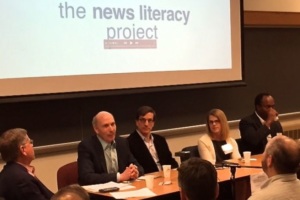 d overflow crowd on Saturday during Wesleyan University’s 2016 reunion and commencement weekend.
d overflow crowd on Saturday during Wesleyan University’s 2016 reunion and commencement weekend.“News literacy is giving truth, or facts, a fighting chance to catch up with falsehoods — or at least not be overwhelmed by them in today’s media-saturated world,” said Alan C. Miller, founder and president of the News Literacy Project (NLP) and a 1976 Wesleyan graduate. “It is teaching that all information is not created equal.”
Miller produced the timely panel as a special WESEMINAR. He was joined by Ethan Bronner ’76, a senior editor at Bloomberg News and a former editor and reporter at The New York Times; Erika Franklin Fowler, an assistant professor of government at Wesleyan who co-directs the Wesleyan Media Project, which tracks and analyzes political ads aired on broadcast television in real time during elections; and Rob King ’84, ESPN’s senior vice president for SportsCenter and news and an NLP board member.
The session was moderated by Alberto Ibargüen ’66, president of the John S. and James L. Knight Foundation, which was instrumental in launching the news literacy movement nationally and was NLP’s initial funder.
“This is a world that relies on personal consumption,” King said. “We have to cater to audiences who are constantly plugged in to their phones. Our job, then, becomes that much more complicated — but also that much more important. You have to get past the wall of emotion an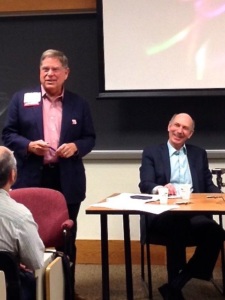 d introduce facts to what people consume.”
d introduce facts to what people consume.”
Miller shared a short video introducing NLP’s cutting-edge Checkology™ virtual classroom that was launched May 2 and is the project’s primary path to national scale and sustainability.
“News literacy is so profoundly important, and this project is amazing,” Fowler said of NLP.
Bronner, who covered education issues while at the Times, described the NLP’s new platform as “pretty fabulous” and “very well done.”
Joseph Kahn ’86, a leading scholar on civic education from Mills College and the chair of the MacArthur Research Network on Youth & Participatory Politics, said that research shows that more education does not decrease an individual’s proclivity to view only information with which they agree as fair and accurate. In fact, he said, erudition increases this tendency.
On the other hand, Kahn said, those who have been exposed to news literacy will show “a major decline” in their refusal to be swayed by factual information that runs contrary to their personal beliefs.